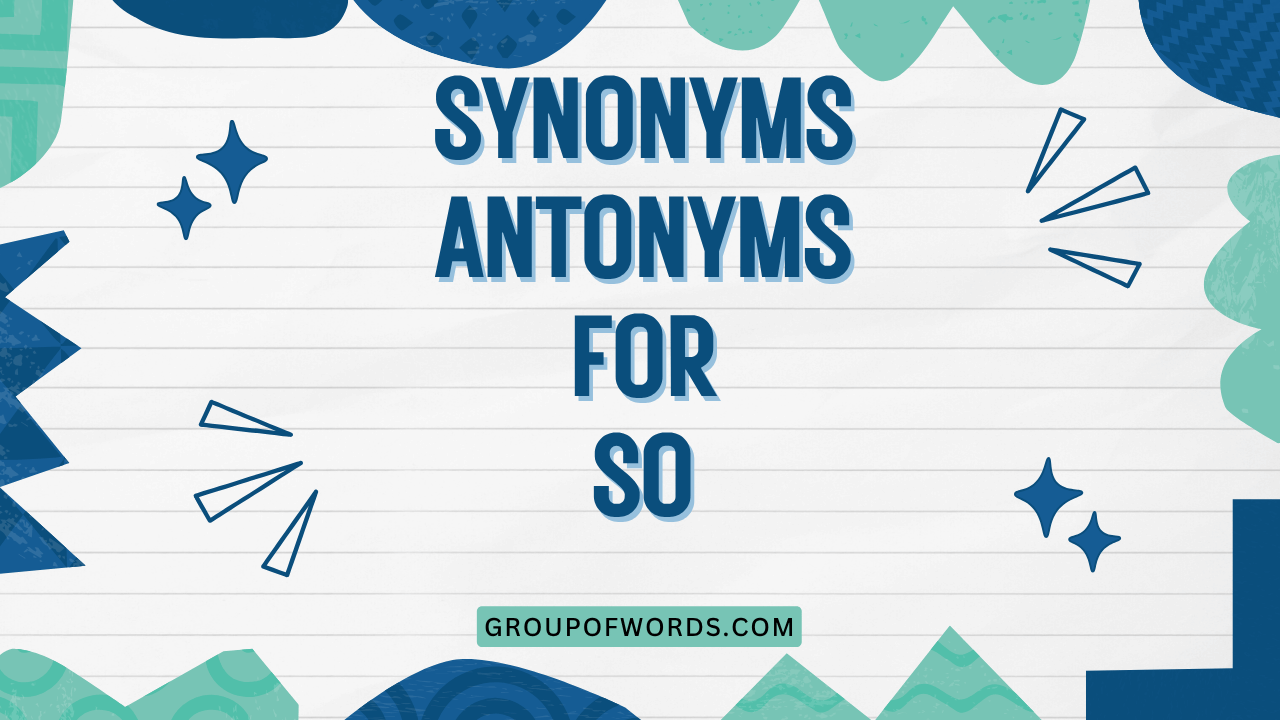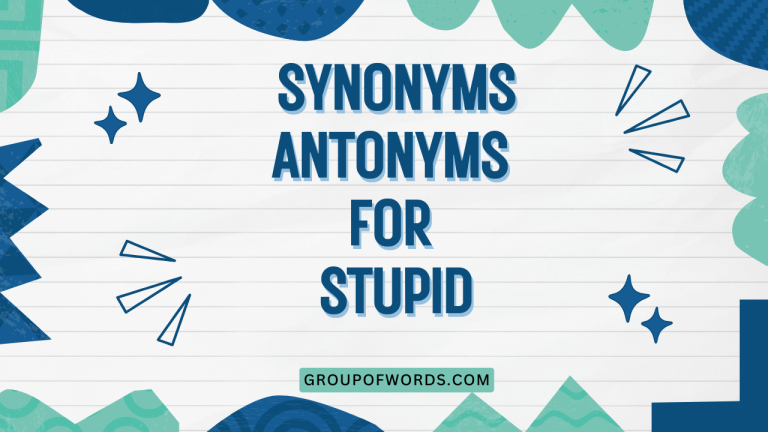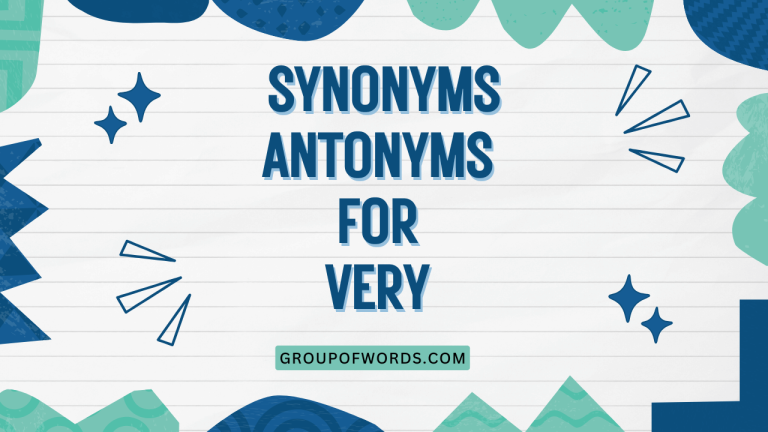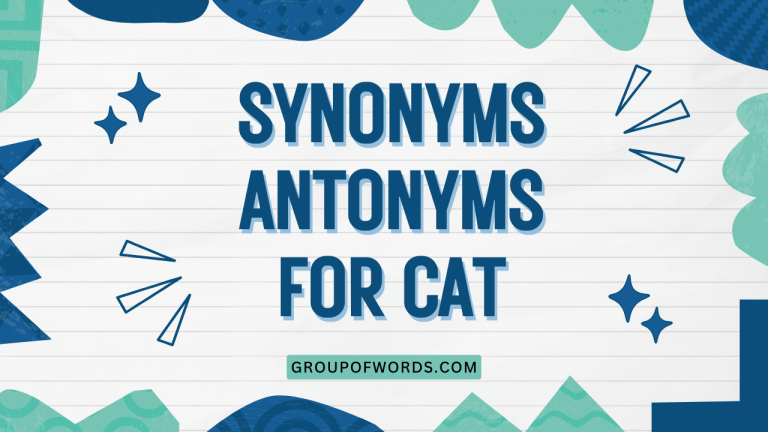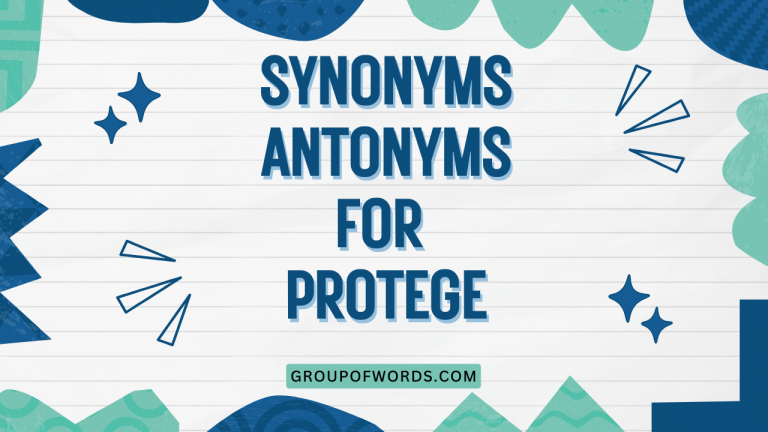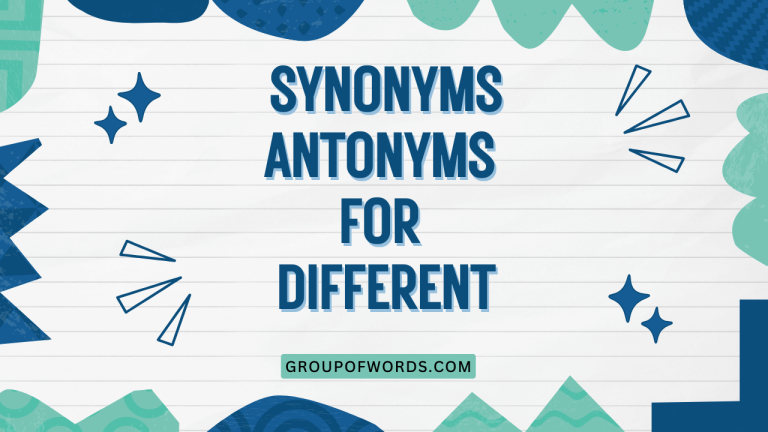Synonyms & Antonyms for “So”: Expanding Your English Vocabulary
Understanding the nuances of the word “so” and its alternatives is crucial for effective communication in English. “So” is a versatile word, functioning as an adverb, conjunction, pronoun, and interjection.
This article delves into the various synonyms and antonyms for “so” in different contexts, enhancing your ability to express yourself with precision and clarity. Whether you’re an English language learner or a native speaker looking to refine your vocabulary, this guide offers comprehensive examples, explanations, and practice exercises to master this essential aspect of English grammar.
By exploring the diverse range of words that can replace “so,” you’ll gain a deeper understanding of how to convey subtle differences in meaning and tone. This knowledge will empower you to write and speak with greater confidence and sophistication, allowing you to tailor your language to suit any situation.
Table of Contents
- Introduction
- Definition of “So”
- Structural Breakdown of “So”
- Types and Categories of “So”
- Examples of Synonyms and Antonyms for “So”
- Usage Rules for “So” and Its Alternatives
- Common Mistakes
- Practice Exercises
- Advanced Topics
- FAQ
- Conclusion
Definition of “So”
The word “so” is remarkably versatile, functioning as an adverb, conjunction, pronoun, and interjection. Each role carries a distinct meaning and usage, making it essential to understand these different facets to effectively employ synonyms and antonyms.
Failing to recognize the specific function of “so” in a given sentence can lead to miscommunication and grammatical errors.
As an adverb, “so” typically modifies verbs, adjectives, or other adverbs, indicating degree or extent. For instance, in the sentence “I am so happy,” “so” intensifies the adjective “happy.” As a conjunction, “so” connects clauses, often indicating cause and effect. For example, “It was raining, so I took an umbrella.” As a pronoun, “so” can stand in for a previously mentioned idea or statement, as in “I told you so.” Finally, as an interjection, “so” can express surprise, agreement, or understanding, often used informally. Its flexibility makes it a common word in everyday speech and writing.
Structural Breakdown of “So”
Understanding the structural role of “so” involves analyzing its position within a sentence and its relationship to other words. As an adverb, “so” usually precedes the adjective or adverb it modifies.
For example, in “She is so talented,” “so” comes before “talented.” As a conjunction, “so” connects two independent clauses, often following a comma. In the sentence, “He studied hard, so he passed the exam,” “so” links the cause (studying hard) to the effect (passing the exam).
When used as a pronoun, “so” typically appears at the end of a sentence or clause, referring back to a previous statement. As an interjection, “so” generally stands alone or begins a sentence, often followed by a comma or exclamation point.
The structural placement of “so” significantly impacts the sentence’s meaning and grammatical correctness. Incorrect placement can lead to ambiguity or ungrammatical constructions.
Therefore, mastering the structural rules governing “so” is crucial for accurate and effective communication. Consider the difference between “so happy” and “happy so,” where the former is grammatically correct and the latter is not.
Similarly, when using “so” as a conjunction, ensuring it correctly links related clauses is essential for logical flow.
Types and Categories of “So”
To fully grasp the versatility of “so,” it’s essential to examine its different categories based on its function within a sentence. Each category has its own set of synonyms and antonyms, allowing for more precise and nuanced expression.
Understanding these distinctions is key to broadening your vocabulary and improving your communication skills.
“So” as an Adverb
When used as an adverb, “so” typically modifies adjectives or other adverbs to indicate degree or intensity. Common synonyms include “very,” “extremely,” “really,” and “incredibly.” Antonyms, which are less common but can be useful in specific contexts, include “slightly,” “somewhat,” “a little,” and “not at all.” The choice of synonym or antonym depends on the specific nuance you wish to convey.
For example, instead of saying “The movie was so good,” you could say “The movie was incredibly good” or “The movie was very good.” Conversely, if you want to express a lesser degree, you could say “The movie was somewhat good.” Understanding these alternatives allows you to fine-tune your expression and communicate your thoughts more precisely. The strength of the adverbial “so” is that it provides emphasis, so the alternatives should reflect the same level of emphasis.
“So” as a Conjunction
As a conjunction, “so” connects two independent clauses, indicating a cause-and-effect relationship or a logical consequence. Synonyms for conjunctive “so” include “therefore,” “consequently,” “as a result,” and “hence.” Antonyms, which indicate a contrasting relationship, include “but,” “however,” “although,” and “despite.” The appropriate choice depends on whether you want to show a causal connection or a contrast.
For instance, instead of saying “It was late, so I went to bed,” you could say “It was late; therefore, I went to bed” or “It was late; as a result, I went to bed.” If you want to show a contrast, you could say “It was late, but I wasn’t tired” or “Although it was late, I wasn’t tired.” Recognizing these alternatives enables you to express different types of relationships between clauses and add variety to your writing.
“So” as a Pronoun
When used as a pronoun, “so” stands in for a previously mentioned statement, idea, or situation. Synonyms are less direct in this case, but phrases like “that is the case,” “that is true,” or “the aforementioned” can convey a similar meaning.
Antonyms are even less common, but phrases like “that is not the case” or “that is false” can express the opposite.
For example, if someone says, “It’s going to rain tomorrow,” and you respond with “I hope so,” you are using “so” as a pronoun to represent the statement “It’s going to rain tomorrow.” A more formal alternative would be “I hope that is the case.” Conversely, if you disagree, you could say “I hope that is not the case.” The pronominal “so” is particularly useful for avoiding repetition and maintaining a concise style of communication.
“So” as an Interjection
As an interjection, “so” expresses a range of emotions, such as agreement, understanding, or surprise. Synonyms include “well,” “okay,” “right,” and “indeed.” Antonyms are less applicable in this context, as interjections typically don’t have direct opposites.
However, expressions of disagreement or disbelief could be considered antonymous in a broader sense.
For instance, if someone explains a complex idea, you might respond with “So, that’s how it works!” expressing understanding. Alternatively, you could say “Okay, I understand” or “Right, that makes sense.” The interjectory “so” is often used informally and adds a conversational tone to your speech.
It can also signal a transition in thought or a shift in topic.
Examples of Synonyms and Antonyms for “So”
The following tables provide extensive examples of synonyms and antonyms for “so” in its various roles. These examples are categorized by the function of “so” (adverb, conjunction, pronoun, and interjection) to illustrate the specific contexts in which each alternative can be used.
Each table provides a range of options, from formal to informal, allowing you to choose the most appropriate word or phrase for your needs.
Adverbial Synonyms and Antonyms
This table illustrates the use of “so” as an adverb and provides synonyms and antonyms with example sentences. The synonyms intensify the adjective or adverb being modified, while the antonyms diminish or negate it.
| Original Sentence | Synonym | Antonym |
|---|---|---|
| The coffee was so hot. | The coffee was extremely hot. | The coffee was slightly hot. |
| She is so talented. | She is incredibly talented. | She is somewhat talented. |
| He ran so fast. | He ran really fast. | He ran not very fast. |
| The movie was so boring. | The movie was terribly boring. | The movie was a little boring. |
| I am so tired. | I am very tired. | I am not at all tired. |
| The food was so delicious. | The food was exceptionally delicious. | The food was barely delicious. |
| The weather is so beautiful. | The weather is remarkably beautiful. | The weather is slightly beautiful. |
| The concert was so loud. | The concert was deafeningly loud. | The concert was moderately loud. |
| The book was so interesting. | The book was utterly interesting. | The book was hardly interesting. |
| She was so angry. | She was furious. | She was calm. |
| He was so happy. | He was ecstatic. | He was sad. |
| The test was so hard. | The test was challenging. | The test was easy. |
| The play was so long. | The play was lengthy. | The play was short. |
| The cake was so sweet. | The cake was sugary. | The cake was bitter. |
| The car was so expensive. | The car was costly. | The car was cheap. |
| He spoke so softly. | He spoke quietly. | He spoke loudly. |
| She sang so beautifully. | She sang wonderfully. | She sang poorly. |
| The sun shone so brightly. | The sun shone intensely. | The sun shone dimly. |
| The wind blew so strongly. | The wind blew powerfully. | The wind blew weakly. |
| The rain fell so heavily. | The rain fell torrentially. | The rain fell lightly. |
Conjunctive Synonyms and Antonyms
This table demonstrates the use of “so” as a conjunction, connecting two independent clauses. Synonyms indicate a cause-and-effect relationship, while antonyms introduce a contrast or contradiction.
| Original Sentence | Synonym | Antonym |
|---|---|---|
| It was raining, so I took an umbrella. | It was raining; therefore, I took an umbrella. | It was raining, but I didn’t take an umbrella. |
| He studied hard, so he passed the exam. | He studied hard; consequently, he passed the exam. | He studied hard, however, he failed the exam. |
| She was tired, so she went to bed early. | She was tired; as a result, she went to bed early. | She was tired, although she stayed up late. |
| The store was closed, so I went home. | The store was closed; hence, I went home. | The store was closed, yet I waited outside. |
| He was late, so he missed the bus. | He was late; for that reason, he missed the bus. | He was late, nevertheless, he caught the bus. |
| The traffic was heavy, so we were delayed. | The traffic was heavy; because of that, we were delayed. | The traffic was heavy, despite we arrived on time. |
| The power went out, so we lit candles. | The power went out; accordingly, we lit candles. | The power went out, still we continued working. |
| The food was delicious, so we ordered more. | The food was delicious; in consequence, we ordered more. | The food was delicious, yet we didn’t order more. |
| The sun was shining, so we went to the beach. | The sun was shining; thus, we went to the beach. | The sun was shining, but we stayed inside. |
| She practiced every day, so she improved quickly. | She practiced every day; in turn, she improved quickly. | She practiced every day, however, she didn’t improve. |
| The price was high, so I didn’t buy it. | The price was high; therefore, I didn’t buy it. | The price was high, but I still bought it. |
| The room was dark, so I turned on the light. | The room was dark; consequently, I turned on the light. | The room was dark, however, I didn’t turn on the light. |
| He felt sick, so he stayed home. | He felt sick; as a result, he stayed home. | He felt sick, although he went to work. |
| The test was easy, so everyone passed. | The test was easy; hence, everyone passed. | The test was easy, yet some people failed. |
| She was happy, so she smiled. | She was happy; for that reason, she smiled. | She was happy, nevertheless, she frowned. |
| The music was loud, so I couldn’t hear. | The music was loud; because of that, I couldn’t hear. | The music was loud, despite I could still hear. |
| The coffee was strong, so I felt energized. | The coffee was strong; accordingly, I felt energized. | The coffee was strong, still I felt tired. |
| The book was interesting, so I finished it quickly. | The book was interesting; in consequence, I finished it quickly. | The book was interesting, yet I didn’t finish it. |
| The weather was cold, so we wore coats. | The weather was cold; thus, we wore coats. | The weather was cold, but we didn’t wear coats. |
| He worked hard, so he achieved his goals. | He worked hard; in turn, he achieved his goals. | He worked hard, however, he didn’t achieve his goals. |
Pronominal Synonyms and Antonyms
This table illustrates the use of “so” as a pronoun, standing in for a previously mentioned statement. Synonyms convey agreement or affirmation, while antonyms express disagreement or negation.
| Original Statement | Response with “So” | Synonym | Antonym |
|---|---|---|---|
| “It’s going to rain tomorrow.” | “I hope so.” | “I hope that is the case.” | “I hope that is not the case.” |
| “She said she’s coming to the party.” | “I believe so.” | “I believe that to be true.” | “I doubt that is true.” |
| “He thinks he can win the race.” | “He seems to think so.” | “He seems to think that is possible.” | “He doesn’t think that is possible.” |
| “The rumor is that they’re getting married.” | “They say so.” | “They say that is correct.” | “They deny that is correct.” |
| “The forecast predicts a sunny day.” | “Let’s hope so.” | “Let’s hope that comes to pass.” | “Let’s hope that doesn’t happen.” |
| “She said she finished the project.” | “Is that so?” | “Is that true?” | “Is that false?” |
| “He claims he can speak multiple languages.” | “He claims so.” | “He claims that is accurate.” | “He denies that is accurate.” |
| “The teacher believes the student cheated.” | “The teacher suspects so.” | “The teacher suspects that is the situation.” | “The teacher doesn’t suspect that is the situation.” |
| “The doctor thinks I’m getting better.” | “The doctor thinks so.” | “The doctor thinks that is occurring.” | “The doctor doesn’t think that is occurring.” |
| “My friend thinks I should apply for the job.” | “My friend advises so.” | “My friend advises that I do that.” | “My friend doesn’t advise that I do that.” |
| “The report suggests the economy is improving.” | “The report indicates so.” | “The report indicates that is the case.” | “The report indicates that is not the case.” |
| “She believes in ghosts.” | “She thinks so.” | “She thinks that is real.” | “She thinks that is not real.” |
| “He wants to travel the world.” | “He plans to do so.” | “He plans to make that happen.” | “He doesn’t plan to make that happen.” |
| “They intend to buy a new house.” | “They intend to do so.” | “They intend to purchase that property.” | “They don’t intend to purchase that property.” |
| “The company aims to increase profits.” | “The company aims to do so.” | “The company aims to achieve that goal.” | “The company doesn’t aim to achieve that goal.” |
| “The government hopes to reduce unemployment.” | “The government hopes to do so.” | “The government hopes to accomplish that objective.” | “The government doesn’t hope to accomplish that objective.” |
| “The athlete trains hard to win.” | “The athlete trains hard to do so.” | “The athlete trains hard to achieve that victory.” | “The athlete doesn’t train hard to achieve that victory.” |
| “The student studies diligently to succeed.” | “The student studies diligently to do so.” | “The student studies diligently to attain that success.” | “The student doesn’t study diligently to attain that success.” |
| “The artist practices daily to improve.” | “The artist practices daily to do so.” | “The artist practices daily to enhance that skill.” | “The artist doesn’t practice daily to enhance that skill.” |
| “She expects to get a promotion.” | “She anticipates so.” | “She anticipates that to happen.” | “She doesn’t anticipate that to happen.” |
Interjectory Synonyms and Antonyms
This table illustrates the use of “so” as an interjection, expressing agreement, understanding, or surprise. Synonyms convey similar emotions, while antonyms (though less direct) might express disagreement or disbelief.
| Original Sentence | Synonym | Implied Antonym |
|---|---|---|
| So, that’s how it works! | Okay, that’s how it works! | Really? I don’t believe it. |
| So, you’re saying we should leave now? | Well, you’re saying we should leave now? | No, I’m not saying that. |
| So, what do you think? | Right, what do you think? | I disagree with the premise. |
| So, you finally finished the book! | Indeed, you finally finished the book! | You didn’t finish it? |
| So, I guess we’ll see you tomorrow. | Alright, I guess we’ll see you tomorrow. | I’m not sure I’ll be there. |
| So, you’re telling me you won the lottery? | Seriously, you’re telling me you won the lottery? | That’s impossible. |
| So, that’s the plan then? | Agreed, that’s the plan then? | I think we should reconsider. |
| So, what’s next? | Now, what’s next? | I don’t want to think about it. |
| So, you’re leaving already? | Already, you’re leaving already? | I wish you would stay. |
| So, you understand now? | Got it, you understand now? | I’m still confused. |
| So, that’s the truth? | Is that so, that’s the truth? | I doubt that’s the truth. |
| So, you agree with me? | Do you, you agree with me? | I disagree with you. |
| So, you can help me? | Can you, you can help me? | I can’t help you. |
| So, you’ve decided to stay? | Have you, you’ve decided to stay? | I’ve decided to leave. |
| So, you’re the one who did it? | Are you, you’re the one who did it? | I didn’t do it. |
| So, you’re not coming? | Aren’t you, you’re not coming? | I am coming. |
| So, you don’t believe me? | Don’t you, you don’t believe me? | I believe you. |
| So, you haven’t eaten yet? | Haven’t you, you haven’t eaten yet? | I have already eaten. |
| So, you can’t fix it? | Can’t you, you can’t fix it? | I can fix it. |
| So, you didn’t know? | Didn’t you, you didn’t know? | I knew all along. |
Usage Rules for “So” and Its Alternatives
The correct usage of “so” and its alternatives depends heavily on the context and the intended meaning. As an adverb, “so” should be placed before the adjective or adverb it modifies.
It’s generally used to express a high degree or intensity. When substituting “so” with synonyms like “very” or “extremely,” ensure that the replacement maintains the intended level of emphasis.
As a conjunction, “so” connects two independent clauses, indicating a cause-and-effect relationship. When replacing “so” with synonyms like “therefore” or “consequently,” ensure that the logical connection between the clauses remains clear.
Avoid using “so” excessively in formal writing; alternatives often provide a more sophisticated tone. When using antonyms like “but” or “however,” ensure that the clauses being connected express a contrasting idea.
As a pronoun, “so” stands in for a previously mentioned statement. In this context, synonyms are less direct and often involve rephrasing the sentence to avoid using “so” altogether.
Ensure that the pronoun “so” clearly refers to the intended statement. As an interjection, “so” expresses a range of emotions.
The choice of synonym depends on the specific emotion you want to convey. Be mindful of the tone and formality of the situation when using interjections.
Common Mistakes
One common mistake is using “so” excessively as an adverb, leading to repetitive and less impactful writing. Varying your vocabulary by using synonyms like “very,” “extremely,” or “incredibly” can improve your writing style.
Another mistake is using “so” as a conjunction without a clear cause-and-effect relationship. Ensure that the clauses being connected by “so” have a logical connection.
Another frequent error is misplacing “so” in a sentence, particularly when used as an adverb. Remember that “so” typically precedes the adjective or adverb it modifies.
Additionally, using “so” informally in formal writing can diminish the credibility of your work. Opt for more formal alternatives like “therefore” or “consequently” in academic or professional contexts.
Also, avoid using “so” as a filler word. Filler words make your sentences longer and less impactful.
Here are some examples of common mistakes and their corrections:
| Incorrect | Correct |
|---|---|
| She was so, so happy. | She was very happy. |
| It was raining, so I was wet, so I went inside. | It was raining, so I was wet; therefore, I went inside. |
| So happy I am! | I am so happy! |
| The report was so long, so I didn’t read it all. | The report was so long that I didn’t read it all. |
Practice Exercises
Test your understanding of synonyms and antonyms for “so” with these practice exercises. Each exercise focuses on a different function of “so” (adverb, conjunction, pronoun, and interjection) to help you master its various uses.
Exercise 1: Adverbial “So”
Replace “so” with a suitable synonym or antonym in the following sentences:
| Question | Answer |
|---|---|
| 1. The weather is so nice today. | 1. The weather is very nice today. |
| 2. He was so tired after the race. | 2. He was extremely tired after the race. |
| 3. The food was so bland. | 3. The food was slightly bland. (antonym) |
| 4. She is so intelligent. | 4. She is incredibly intelligent. |
| 5. The music was so loud. | 5. The music was deafeningly loud. |
| 6. The test was so easy. | 6. The test was remarkably easy. |
| 7. The task was so difficult. | 7. The task was exceptionally difficult. |
| 8. The presentation was so boring. | 8. The presentation was terribly boring. |
| 9. The room was so dark. | 9. The room was completely dark. |
| 10. The exercise was so helpful. | 10. The exercise was quite helpful. |
Exercise 2: Conjunctive “So”
Replace “so” with a suitable synonym or antonym in the following sentences:
| Question | Answer |
|---|---|
| 1. It was raining, so I stayed inside. | 1. It was raining; therefore, I stayed inside. |
| 2. He was tired, so he went to bed early. | 2. He was tired; consequently, he went to bed early. |
| 3. She studied hard, so she passed the exam. | 3. She studied hard; as a result, she passed the exam. |
| 4. The store was closed, so I went home. | 4. The store was closed; hence, I went home. |
| 5. He was late, so he missed the bus. | 5. He was late; for that reason, he missed the bus. |
| 6. She felt sick, so she stayed home. | 6. She felt sick, but she still went to work. (antonym) |
| 7. The traffic was heavy, so we were delayed. | 7. The traffic was heavy; because of that, we were delayed. |
| 8. The power went out, so we lit candles. | 8. The power went out; accordingly, we lit candles. |
| 9. The food was delicious, so we ordered more. | 9. The food was delicious, yet we didn’t order more. (antonym) |
| 10. The sun was shining, so we went to the beach. | 10. The sun was shining; thus, we went to the beach. |
Exercise 3: Pronominal “So”
Complete the following sentences using “so” as a pronoun, then provide a synonym and an antonym:
| Original Statement | Response with “So” | Synonym | Antonym |
|---|---|---|---|
| “It’s going to be a hot summer.” | “I hope so.” | “I hope that is the case.” | “I hope that is not the case.” |
| “They say the economy is improving.” | “I believe so.” | “I believe that to be true.” | “I doubt that is true.” |
| “She claims she can speak five languages.” | “She seems to think so.” | “She seems to think that is possible.” | “She doesn’t think that is possible.” |
| “The forecast predicts rain tomorrow.” | “Let’s hope so.” | “Let’s hope that comes to pass.” | “Let’s hope that doesn’t happen.” |
| “He said he finished the project on time.” | “Is that so?” | “Is that true?” | “Is that false?” |
| “The teacher thinks the student cheated.” | “The teacher suspects so.” | “The teacher suspects that is the situation.” | “The teacher doesn’t suspect that is the situation.” |
| “My doctor thinks I’m getting better.” | “The doctor thinks so.” | “The doctor thinks that is occurring.” | “The doctor doesn’t think that is occurring.” |
| “My friend advises me to take the job offer.” | “My friend advises so.” | “My friend advises that I do that.” | “My friend doesn’t advise that I do that.” |
| “The report indicates the company is doing well.” | “The report indicates so.” | “The report indicates that is the case.” | “The report indicates that is not the case.” |
| “She believes in life after death.” | “She thinks so.” | “She thinks that is real.” | “She thinks that is not real.” |
Exercise 4: Interjectory “So”
Rewrite the following sentences using a synonym for “so” as an interjection:
| Question | Answer |
|---|---|
| So, that’s what you’ve been up to! | Okay, that’s what you’ve been up to! |
| So, you’re finally here! | Well, you’re finally here! |
| So, what do you want to do tonight? | Right, what do you want to do tonight? |
| So, you agree with my proposal? | Indeed, you agree with my proposal? |
| So, I guess that’s settled then. | Alright, I guess that’s settled then. |
| So, you’re telling me you won the lottery? | Seriously, you’re telling me you won the lottery? |
| So, that’s the plan then? | Agreed, that’s the plan then? |
| So, what’s next on the agenda? | Now, what’s next on the agenda? |
| So, you’re leaving already? | Already, you’re leaving already? |
| So, you understand the instructions? | Got it, you understand the instructions? |
Advanced Topics
For advanced learners, exploring idiomatic expressions and more nuanced uses of “so” can further enhance vocabulary and communication skills. Consider the phrase “so to speak,” which is used to soften a statement or indicate that it’s not entirely accurate.
Understanding such idioms requires a deeper understanding of context and cultural nuances.
Another advanced topic is the use of “so” in complex sentence structures, such as conditional sentences or sentences with multiple clauses. Analyzing how “so” functions in these contexts can improve your ability to construct grammatically correct and logically coherent sentences.
Additionally, studying the historical evolution of “so” and its various meanings can provide valuable insights into the English language.
FAQ
Q: Is it always necessary to replace “so” with a synonym?
A: No, it is not always necessary. “So” is a versatile word and perfectly acceptable in many contexts.
However, varying your vocabulary can make your writing more engaging and precise.
Q: Can “so” always be replaced with “very”?
A: No, “so” cannot always be replaced with “very.” While both can function as adverbs of degree, “so” is often used in contexts where “very” would sound awkward or unnatural. For example, “I told you so” cannot be replaced with “I told you very.”
Q: Are there any situations where it’s best to avoid using “so”?
A: Yes, in formal writing, it’s often best to avoid using “so” excessively. Opt for more formal alternatives like “therefore,” “consequently,” or “as a result.” Additionally, avoid using “so” as a filler word in any context.
Q: How can I improve my understanding of when to use “so” and its alternatives?
A: Practice, practice, practice! Pay attention to how native speakers use “so” and its alternatives in different contexts.
Read widely and analyze the language used in various types of writing. Complete practice exercises and seek feedback from teachers or language partners.
Q: What is the difference between “so that” and “so”?
A: “So” can function as an adverb, conjunction, pronoun, or interjection. “So that” is a conjunction that indicates purpose or intention.
For example: “I exercise so that I can stay healthy.”
Conclusion
Mastering the synonyms and antonyms for “so” is an essential step in expanding your English vocabulary and improving your communication skills. By understanding the various functions of “so” and its alternatives, you can express yourself with greater precision and clarity.
Remember to consider the context, tone, and formality of the situation when choosing the most appropriate word or phrase.
Continue practicing and exploring the nuances of the English language to further enhance your vocabulary and communication abilities. With dedication and effort, you can master this essential aspect of English grammar and communicate with confidence and sophistication.
